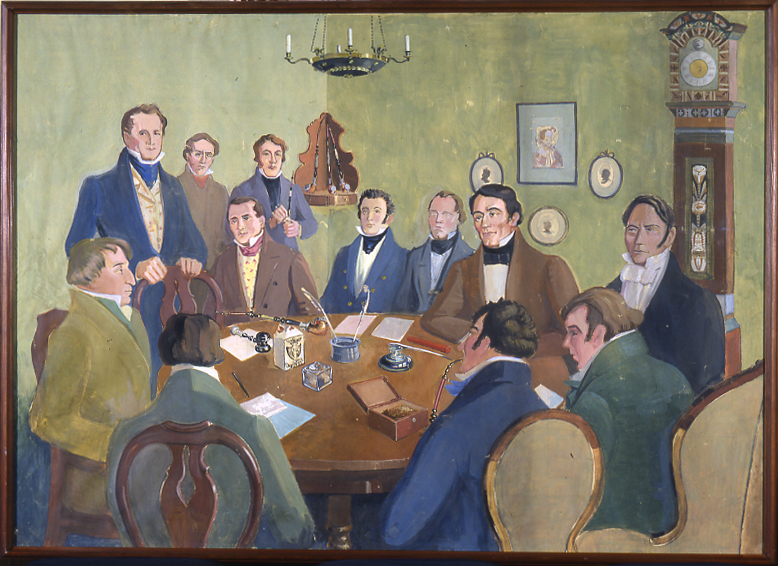Did you know?
The word “kirjallisuus” was coined in 1831 for the name of SKS
The Finnish Literature Society (Suomalaisen Kirjallisuuden Seura) was founded in 1831 by members of the university in Helsinki who shared a dream of making the Finnish language into a language of science and literature. One of the founders of the Society was Elias Lönnrot, who is best known as the compiler of the Finnish national epic, the Kalevala. He also became the first secretary of the Society. Known as a productive wordsmith in Finnish, Lönnrot coined the word kirjallisuus (Finnish for ‘literature’) for the name of SKS. The word appeared for the first time in the minutes of the founding meeting of SKS on 16 February 1831.
A group of young university men gathered at the home of Carl Niklas Keckman, a lecturer in Finnish language at the Imperial Alexander University (today the University of Helsinki). In the minutes of the meeting, Elias Lönnrot wrote:
“And when they were there, talk emerged of Finnish means of the book, and especially the Finnish language, and how to make it best suited for literary purposes. The conversation finally ended with the insight that, however the matter may be promoted, it is easier to do by many persons than by just one, and for this reason the foundation of a Society was discussed […].”
At the founding meeting a week later, the kirja keinot (‘means of the book’) had turned into kirjallisuus (‘literature’), and the society was given the name of Suomalaisen Kirjallisuuden Seura (Finnish Literature Society).
The first decades of the 19th century were the time of the rise of national cultures throughout Europe. The national awakening of Finns was also supported by the development of power politics in the region. In 1809, Finland was annexed by the Russian Empire, and an intellectual separation of the country from Sweden also fit in with Russian plans. This provided an opportunity for raising the level of education of the Finnish-speaking majority population.
The Finnish Literature Society was founded in 1831 by men active at the university in Helsinki who had an interest in the Finnish language and believed in the future of its literary cultivation. They had received their own education and the intellectual stimulation for the project at the Turku Academy, where H. G. Porthan, a scholar of history and folklore, was influential at the end of the previous century. The literary societies founded in European university towns from the end of the 18th century also served as a model.
In the first statutes of the Society, it was emphasised that “language is the foundation of nationality”. The Society was not only an academic discussion club, but also a centre for the growth of the national spirit. It attracted members not only from civil servants and university students, but also educated laymen, and from 1846, women as well.
The most far-reaching projects of the early days were the collection and publication of folk poetry. The Society supported the collecting trips of its first secretary Elias Lönnrot in Eastern Finland and Karelia and published the works based on the results of these trips, the Kalevala (1835, 1849) and Kanteletar (1840).
By publishing folk poetry, it was possible to add to the scarce literature in Finnish and, at the same time, enrich literary Finnish with lively expressions of the vernacular language. The Society began to produce both non-fiction and fiction in Finnish: histories, grammars, dictionaries; popularised presentations on topics such as the natural sciences and legislation; as well as translations of classics of world literature. Writing competitions were used to seek out new authors of stories and plays. The first novel written in Finnish, Seven Brothers by Aleksis Kivi, was published by the Society in 1870.
In this way, the traditional creation, recording and transmission of knowledge and culture, based on oral traditions, became written as a result of the work of SKS. The change led to a society-wide turn towards the written word. This was not only about the transmission and storage of information, but equally about its production and the conceptualisation of reality.
All key Finnish-language learned societies and many institutions in the humanities were born in the 19th century within the sphere of influence of SKS. It influenced the birth of the Finnish National Theatre; national business life and capital; and the establishment of the Finnish system of political parties. Although SKS settled in its handsome building in the capital in 1890 and was led by the learned men of Helsinki, it created an axis that permeated Finnish society and culture, with local keepers of the flame at the other end.


